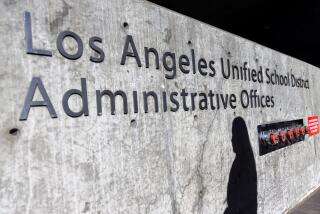Keys on Alerting Peers, Teachers to Danger Signs : Course to Combat Youth Suicides
- Share via
In an effort to combat teen-age suicide, California is designing a course to instruct students, parents and teachers about danger signals and what to do about them.
At a conference Monday in Anaheim, Michael L. Peck, director of the California Youth School Suicide Prevention Program, said the course, to be available in June, will teach students how to help suicidal classmates who confide in them.
“Suicidal children don’t tell their parents or teachers or family doctor; they tell their friends,” Peck said. Those friends, he pointed out, often don’t know what to do or say.
“One of the things we are attempting to do in the state of California is accept the fact that the (teen-age suicide) problem has become dramatic and to do something about it through the most obvious audience, and that is the classroom,” Peck added.
The program will target students he said, because “about one-third of them come into contact, in one way or another, with other students thinking about suicide . . . .” The suicidal students, he said, “usually tell their friends, ‘Don’t tell anyone.’ And the friends are overwhelmed; they don’t know what to do.”
The course will teach students “first and foremost,” Peck said, “that they’re not counselors, they’re not mental health specialists. We just expect them to be helpful friends.”
Peck, a Los Angeles psychologist, said: “Teachers and staff also have to be educated, and there is a parent-awareness program that goes with it.”
Schools won’t be required to offer the course, Peck said, adding that it has received legislative support. State Sen. Robert Presley (D-Riverside) sponsored enabling legislation, and Gov. George Deukmejian signed it into law in 1983. In the interim, Peck said, the curriculum has been developed and tested as a pilot program.
The program will consist of four to five sessions, he said, including one session for school staff and one for parents. Participants will be trained to watch for students who, for instance, suddenly lose weight or start using drugs or alcohol.
Further, he said: “Do they seem withdrawn? Are they no longer interested in the things they were before? Are they staying in their room? Crying and feeling sad? When a student tells another student about these things, the student needs to know what to do.”
Peck said the most important response is for the friends “to tell them you are there and that you care; that you care what happens to them.” The friends should “not promise to keep a secret about it because the life involved is too important.”
‘It Will Pass’
The most important thing, Peck said, is “to let them (the suicidal young people) know that no matter how badly they feel now, it will pass; it will always pass, it will get better, but it will get better more quickly if they go to an adult, and the next job is for (the friends) to convince the student to go seek help.”
Peck said that each school should appoint staffers to counsel possibly suicidal students. “It may turn out, though, that the student won’t want to go to that person, so we then want their friends to ask them, ‘Which teacher do you trust?’ ” he said. “Sometimes it may be somebody like a lunchroom worker that is the only person the student will trust; that is why this program is for the whole staff.”
Teen-age suicide has increased 200% in the United States since the 1950s, Peck said. By contrast, he said, the suicide rate in the past three decades has decreased among people 30 and older.
Orange County educators in the audience said they agreed with the need for an anti-suicide program. One school administrator said: “Last week we lost (by suicide) a young man who had a 3.8 grade-point average after he made a B in an honors course.”
Peck responded that it is dangerous for students or anyone else “to put all their eggs in one basket, to have their self-concept tied to anything so strongly.”
He also said that a major reason for increased suicides in schools is the rising use of drugs “among very young students.”
Peck’s comments came during a conference sponsored by the Anaheim Union High School District, the U. S. Justice Department, the National Institute of Justice and the U. S. Department of Education. The conference at the Anaheim Convention Center was titled “Multi-Agency Cooperation--the Anaheim Way.”
Anaheim is one of four cities in the United States picked for a federal pilot project to study ways to reduce student criminal and discipline problems.
More to Read
Sign up for Essential California
The most important California stories and recommendations in your inbox every morning.
You may occasionally receive promotional content from the Los Angeles Times.













